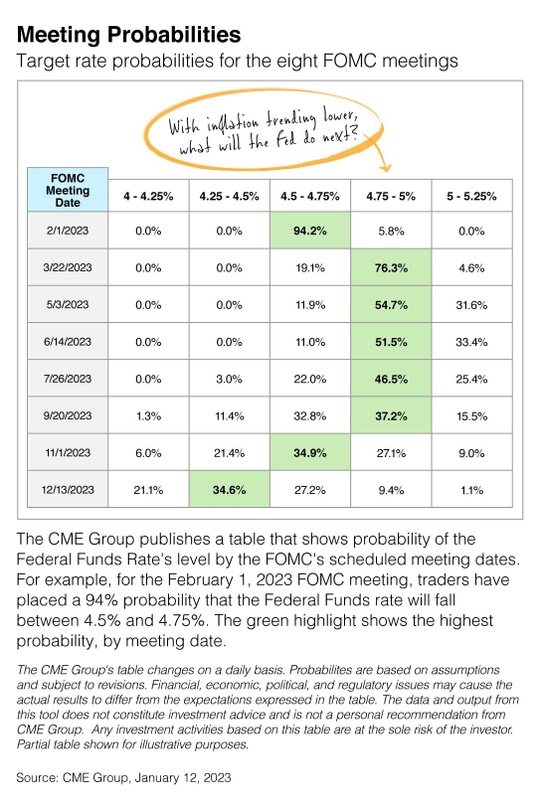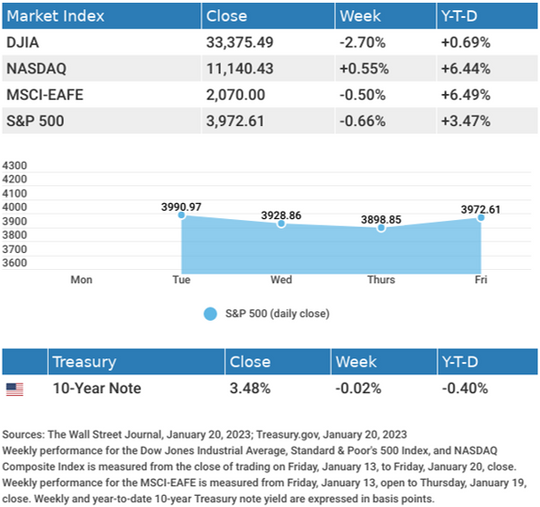Mixed Economic Data
Stocks weakened to start the week amid discouraging corporate earnings and troubling economic data. Disappointing retail sales and manufacturing reports sparked concerns that the Fed may have gone too far in hiking rates, while a drop in initial jobless claims diminished chances of a near-term pause in rate hikes. Welcome news from two big technology names on Friday powered a strong rally that mixed significant indices.
The start of the earnings season was a drag on investor sentiment. While 69% of the S&P 500 constituent companies that reported earnings by Thursday (48 companies) exceeded expectations, the percentage of “beats” is below the three-year average. More concerning, however, was that average earnings declined by more than 2%.4
Consumers Retrench
Retail sales fell 1.1% in December, capping an overall weak holiday shopping season. November retail sales were revised downward to -1.0%, from the earlier estimate of -0.6%. Compared to November-December 2021, sales increased by 5.3%, below the 6 to 8% increase expected by The National Retail Federation.5,6
Many economists viewed these lackluster numbers as evidence of a weakening consumer. A more cautious consumer raises more concerns about a recession at some point this year since the primary driver of U.S. economic growth is consumer spending.
This Week: Key Economic Data
Tuesday: Purchasing Managers’ Index Composite.
Thurday: Gross Domestic Product (GDP). Durable Goods Orders. New Home Sales. Jobless Claims.
Friday: Consumer Sentiment.
Source: Econoday, January 20, 2023
The Econoday economic calendar lists upcoming U.S. economic data releases (including key economic indicators), Federal Reserve policy meetings, and speaking engagements of Federal Reserve officials. The content is developed from sources believed to be providing accurate information. The forecasts or forward-looking statements are based on assumptions and may not materialize. The forecasts also are subject to revision.
This Week: Companies Reporting Earnings
Tuesday: Microsoft Corporation (MSFT), General Electric Company (GE), Verizon Communications, Inc. (VZ), Johnson & Johnson (JNJ), Lockheed Martin Corporation (LMT), Texas Instruments, Inc. (TXN), Union Pacific Corporation (UNP), D.R. Horton, Inc. (DHI), Raytheon Technologies Corporation (RTX).
Wednesday: AT&T, Inc. (T), The Boeing Company (BA), Tesla, Inc. (TSLA), International Business Machines Corporation (IBM), Lam Research Corporation (LRCX), Abbott Laboratories (ABT), CSX Corporation (CSX), NextEra Energy, Inc. (NEE), KimberlyClark Corporation (KMB), Norfolk Southern Corporation (NSC), General Dynamics (GD).
Thursday: Intel Corporation (INTL), Visa, Inc. (V), Mastercard, Inc. (MA), Blackstone, Inc. (BX), Northrop Grumman Corporation (NOC), Southwest Airlines Co. (LUV), Rockwell Automation, Inc. (ROK).
Friday: Chevron Corporation(CVX), HCA Healthcare, Inc. (HCA), American Express Company (AXP), ColgatePalmolive Company (CL).
Source: Zacks, January 20, 2023










